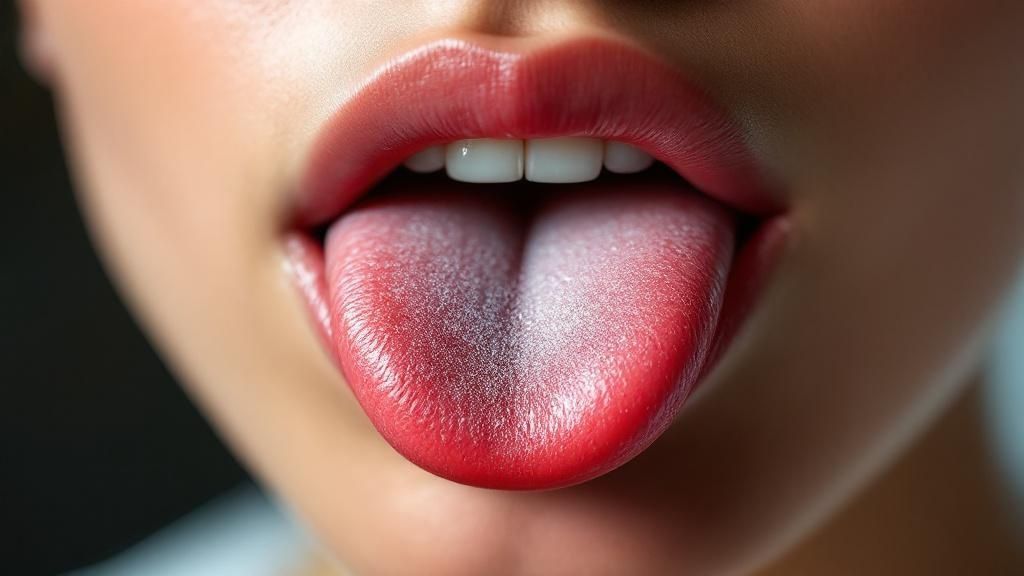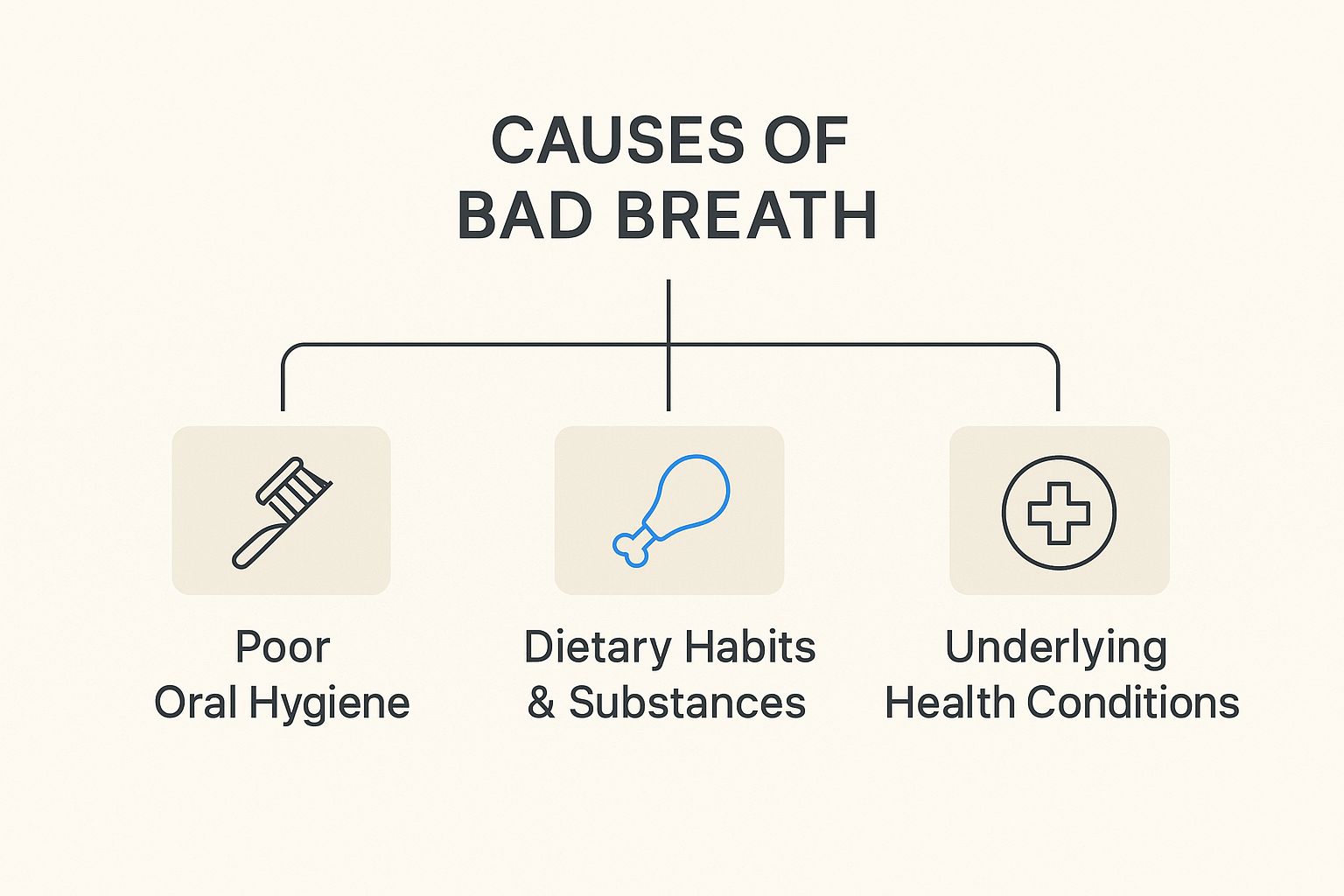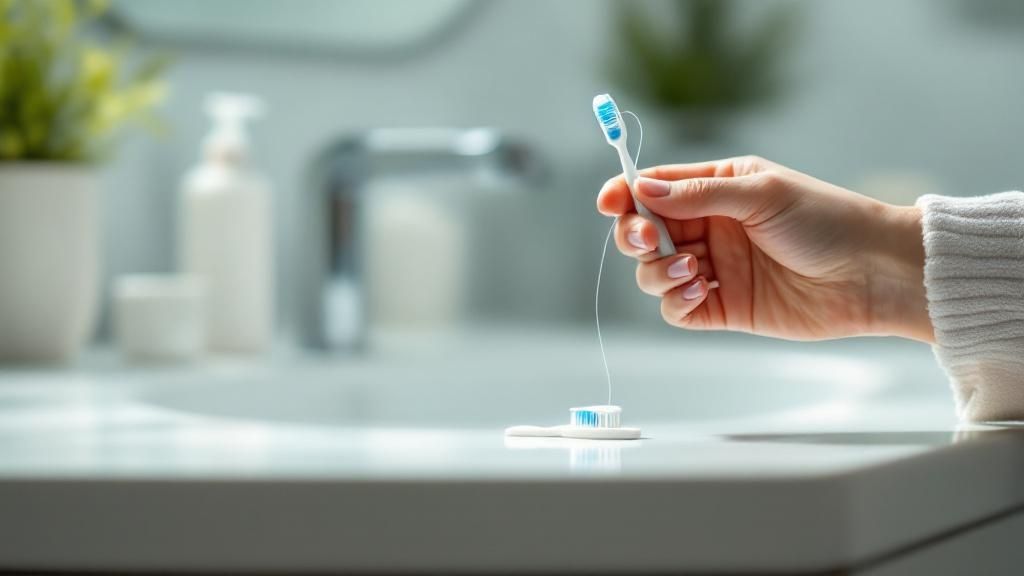If you’ve ever felt a bit self-conscious about your breath, you’re definitely not alone. It’s a very common concern. The simple truth is that what we call bad breath, or halitosis, usually comes down to bacteria in your mouth breaking down tiny bits of leftover food. Often, the main culprits are things like poor oral hygiene, the foods you eat, and even a dry mouth.
Why Your Breath Is A Common Confidence Killer

Worrying about your breath can cast a shadow over everything, from a big presentation at work to a quiet moment with a loved one. It’s a common issue that plenty of Wellingtonians deal with, but it doesn’t have to dictate your confidence. Think of this guide as a safe, judgement-free space to get to the bottom of it.
Here at City Dentists, our mission is to empower you with clear, gentle explanations so you feel completely in control of your oral health. We get it—even thinking about a dental visit can be stressful. That’s exactly why we’ve built our practice around creating a caring, reassuring atmosphere for every single person who walks through our doors.
Understanding The Prevalence in New Zealand
Bad breath is far more common than you might imagine, even right here in New Zealand. A study focusing on young adults discovered that nearly a third had clinically significant levels of the compounds that cause bad breath. What’s really interesting is that how people thought their breath smelled didn’t always line up with the clinical results, which just goes to show how tricky it is to judge for yourself. You can take a closer look at the findings of this NZ-based study on halitosis.
This highlights a crucial point: you don’t have to guess or worry in silence. The most direct path to a solution is getting a clear, professional opinion.
“Your oral health is a key part of your overall wellbeing and confidence. Understanding what causes bad breath is the first step towards taking control and finding a lasting solution.”
Our team uses modern, gentle techniques to pinpoint the specific cause of your concern. We’re not here just to mask the symptoms; we partner with you to restore your oral health and, along with it, your peace of mind.
Let’s break down the main sources of bad breath together, giving you the knowledge you need to take that first step towards lasting freshness.
Before we dive deep, here’s a quick overview of the most common reasons for bad breath. This table can help you start connecting the dots.
Quick Guide to Common Bad Breath Causes
| Cause Category | Brief Explanation | Simple First Step |
|---|---|---|
| Oral Hygiene | Food particles get trapped, and bacteria break them down, releasing odours. Plaque buildup makes it worse. | Improve your brushing and flossing routine, making sure to clean your tongue. |
| Dietary Factors | Strong-smelling foods like garlic and onions are absorbed into your bloodstream and exhaled. | Drink plenty of water after meals to help rinse away food particles. |
| Lifestyle Habits | Smoking and alcohol both create a dry mouth, which is a perfect environment for odour-causing bacteria to thrive. | Reduce intake and increase your water consumption to combat dryness. |
| Medical Issues | Some conditions, like sinus infections or acid reflux, can cause breath odours that aren’t related to your mouth. | If your oral hygiene is excellent, consider chatting with your GP. |
This is just a starting point, of course. Each of these areas has more detail to uncover, which we’ll explore next.
Understanding Your Mouth’s Hidden Ecosystem
The journey to fresher breath almost always starts right inside your mouth. To really get what causes bad breath, it helps to think of your mouth not just as a set of teeth, but as a complex and bustling ecosystem, home to millions of microorganisms. This isn’t something to be alarmed by; in fact, it’s completely normal.
When this ecosystem is balanced, everything works in harmony. But when leftover food particles—especially from sugary or starchy foods—get left behind after a meal, they become a feast for certain types of bacteria. As these bacteria break down the particles, they release smelly substances known as volatile sulfur compounds (VSCs). These compounds are the primary culprits behind that unwanted oral odour.
This infographic does a great job of breaking down the main origins of bad breath and showing how they all connect.

As you can see, while things like your diet and overall health play a part, poor oral hygiene is often the central factor that lets bad breath take hold.
The Role of Plaque and Your Gums
You’ve probably heard your dentist talk about plaque. Plaque is a sticky, colourless film of bacteria that’s constantly forming on your teeth. If it’s not removed every day with brushing and flossing, it creates the perfect protective layer for those odour-causing bacteria to multiply.
This is where your daily routine becomes so critical. Consistent, gentle brushing and flossing are your first and best line of defence. They work to disrupt and remove this plaque biofilm before it can harden into tartar and create bigger problems, like gum inflammation (gingivitis)—another common contributor to bad breath.
Your mouth is designed to have a healthy balance of bacteria. The goal isn’t to eliminate all of them, but to manage the ones that cause issues by keeping their food source—leftover particles and plaque—to a minimum.
Don’t Forget Your Tongue
One of the most overlooked spots in the fight against bad breath is the tongue. The surface of your tongue, with all its tiny bumps and grooves, is an ideal hiding place for bacteria and food debris. Think of it like a shaggy carpet where smelly compounds can build up undisturbed.
Gently cleaning your tongue once a day with a tongue scraper or even the back of your toothbrush can make a remarkable difference. This simple step physically removes the bacterial buildup that contributes so heavily to halitosis. To dive deeper into the science behind this, you might be interested in our detailed look into the causes of halitosis.
Local research backs this up, too. A New Zealand study found that among patients worried about bad breath, poor oral hygiene was a leading factor. It’s reassuring to know that the main cause is often something you have direct control over.
By viewing your oral care routine as a way to maintain a healthy ecosystem, it can feel less like a chore and more like a positive act of self-care.
When Your Breath Signals a Deeper Oral Issue

While a consistent oral hygiene routine is your best friend in the fight for fresh breath, sometimes the issue goes deeper than what brushing and flossing can reach. If you find bad breath lingers despite your best efforts, it might be your mouth’s way of sending up a flare, signalling a problem that needs a professional, caring eye.
This isn’t a reason to feel anxious—it’s a reason to feel empowered. Identifying a deeper oral issue is the first, most crucial step toward resolving it for good. At City Dentists, we see this as a partnership. Our job is to help you understand what’s happening in a clear and gentle way, making the path to a solution feel comfortable and stress-free.
When Bacteria Find a Hiding Spot
Some oral health conditions create protected environments where odour-causing bacteria can thrive, shielded from your toothbrush and floss. Think of it like a fortress where these bacteria can multiply without interruption.
Common culprits include:
- Advanced Gum Disease (Periodontitis): This condition creates deep pockets between your teeth and gums. These pockets are impossible to clean at home and become perfect reservoirs for bacteria, leading to a very distinct and persistent odour.
- Tooth Decay (Cavities): A cavity is essentially a hole in your tooth. Food and bacteria get trapped inside, and as the decay progresses, it produces a foul smell that brushing can’t eliminate.
- Hidden Infections: An underlying abscess or a hidden infection around the root of a tooth can also be a significant source of bad breath.
Understanding how these issues can cause bad breath is important, and you can learn more about how dental issues cause bad breath in our related article.
The City Dentists Approach to Finding the Cause
We know the thought of a dental problem can be daunting, but you are in safe, experienced hands with our Wellington team. At City Dentists we use our expertise to thoroughly investigate and diagnose the issue, always prioritising your comfort. We take the time to create an impression of your teeth when needed, ensuring any restorative work fits perfectly and doesn’t create new places for bacteria to hide.
Identifying the root cause is about more than just fresh breath; it’s about restoring your mouth to full health and preventing more serious problems down the line. Our focus is always on gentle, modern care that puts you at ease.
In New Zealand, there is a clear link between oral health conditions like gum disease and bad breath. Sadly, disparities mean that some communities face a greater burden of tooth decay and untreated gum issues, which directly increases the prevalence of bad breath from oral infections. This reinforces why accessible, supportive dental care is so important for every Wellingtonian.
How Your Diet and Lifestyle Affect Your Breath
It’s easy to think fresh breath is all about brushing and flossing, but what you eat, drink, and do every day often plays an even bigger part. Once you understand this connection, you can make small, powerful changes that really make a difference.
We all know strong foods like garlic and onions can stick around for a while. But it’s not just about tiny food particles left in your mouth. When you digest these foods, their potent compounds get absorbed into your bloodstream, travel to your lungs, and are then breathed out. That’s why the scent can last for hours, long after your toothbrush has done its job.
The Impact of What You Eat
The kind of diet you follow can also create its own unique type of breath. For example, diets that are very low in carbohydrates and high in protein can cause the body to produce compounds called ketones. While this is a normal part of metabolism, ketones have a distinct, sometimes fruity or acetone-like smell that gets released when you exhale.
But it’s about more than just avoiding certain foods. A well-rounded, balanced diet is the foundation for a healthy mouth. To help you get started, our team has put together a guide on 5 foods that contribute to bad breath, full of practical tips that don’t require you to give up all your favourites.
Your daily habits are a huge piece of the puzzle. The goal isn’t to be perfect but simply to be aware. Making small tweaks to what you eat and how you live can have a massive impact on your oral health and confidence.
How Lifestyle Habits Tip the Scales
Some lifestyle choices are well-known culprits for halitosis, mostly because they create the perfect conditions for odour-causing bacteria to thrive.
- Smoking: Tobacco doesn’t just leave its own unmistakable, unpleasant odour; it also seriously dries out your mouth. This drop in saliva—your mouth’s natural cleaning service—lets bacteria multiply without restraint. It also raises your risk for gum disease, another major source of bad breath.
- Alcohol Consumption: Much like smoking, alcohol has a dehydrating effect. A dry mouth can’t effectively wash away food debris or neutralise acids, turning it into an ideal breeding ground for smelly bacteria.
Your breath is also a reflection of your overall health, and that includes your digestive system. For a more holistic approach, these simple tips for better digestion and gut health can help create a healthier internal environment, which often translates to fresher breath. Every positive change, no matter how small, adds up. And remember, our friendly Wellington team is always here to offer supportive, non-judgemental advice.
Uncovering Non-Dental Causes of Bad Breath

While the vast majority of bad breath cases start in the mouth, sometimes the real culprit is hiding elsewhere in the body. If your oral hygiene is top-notch but the odour just won’t go away, it might be your body’s way of sending a signal about your general health. This isn’t usually a reason to panic, but it’s a good reason to understand the bigger picture.
Here in Wellington, our dentists see this as a key part of our duty of care—helping you connect the dots. A persistent issue that isn’t fixed with better brushing and flossing just means we need to dig a little deeper. The first step, always, is a thorough dental check-up so we can confidently rule out any oral health problems.
When Your Mouth Becomes Too Dry
One of the most common non-dental culprits is a condition called xerostomia, which is the clinical term for dry mouth. Think of saliva as your mouth’s natural cleaning service; it’s constantly rinsing away food particles and neutralising acids. When there isn’t enough of it, bacteria can multiply without anything to stop them, leading to halitosis.
Dry mouth is a very common side effect of many medications, including those for allergies, high blood pressure, and anxiety. It can also be linked to certain medical conditions. We can explore this with you when you visit us in our clinic.
Visiting your dentist is the crucial first step. By ruling out oral causes like plaque buildup or gum inflammation, we can provide trusted guidance and reassurance, suggesting a chat with your GP if needed.
Systemic Conditions and Your Breath
In some instances, your breath can be a mirror, reflecting what’s happening in other parts of your body. These situations are less common, but it’s still helpful to be aware of them.
- Sinus and Tonsil Issues: Infections or inflammation in your sinuses or tonsils can lead to post-nasal drip, which often has a very distinct and unpleasant odour.
- Stomach and Gut Health: Conditions like acid reflux (GERD) can let stomach acids creep up into your throat, creating a sour smell. Beyond reflux, an imbalance in your gut’s ecosystem can sometimes be a factor. Research is increasingly pointing to a strong link between probiotics and gut health, which can influence your overall wellbeing in many ways.
If you’re ever worried about your gum health, which is a primary oral cause of bad breath, you can find some great information in our guide on what you need to know about gingivitis. Our friendly team is always here to help you get a clear, complete picture of your health.
Your Action Plan for Fresh Breath
Alright, now that we understand what’s behind bad breath, it’s time for the most important part: doing something about it. This is where we put all that knowledge into practice with a simple, straightforward plan. You don’t have to figure this out on your own—think of our team at City Dentists as your partners in all of this.
The best way to get to the bottom of things is with a professional clean with a Dental Hygienist and check-up. It’s the only way to get a truly clear picture. We can gently and thoroughly assess what’s happening, pinpoint the exact cause of your concern, and create a plan that’s tailored just for you. It’s the most direct path to peace of mind.
Your Simple Daily Checklist
Great oral hygiene isn’t about grand gestures; it’s about the small, consistent habits you build every day. Here’s a simple checklist to guide you towards fresher breath and a healthier mouth:
- Brush Thoroughly, Twice a Day: Give it the full two minutes each time. Pay special attention to the gumline—that’s where plaque loves to accumulate.
- Floss Daily. No Exceptions: This is non-negotiable. Brushing misses the food and bacteria between your teeth, and flossing is the only way to get them out.
- Clean Your Tongue: A quick scrape or brush of your tongue just once a day can remove a massive amount of odour-causing bacteria.
- Stay Hydrated: Sipping water throughout the day is a simple but powerful habit. It helps rinse your mouth and fights the dryness that bacteria thrive in.
For a few more practical tips, have a look at our guide on 5 ways to get rid of bad breath.
Partnering with your dentist is the most empowering step you can take. It’s not just about a clean mouth—it’s about feeling confident, healthy, and in control of your wellbeing.
Here at City Dentists, we put our patients first. We know a trip to the dentist can be a source of anxiety for some, and we’ve worked hard to create a comfortable, reassuring space for every Wellingtonian who walks through our doors. We’re here to listen, answer your questions, and provide gentle, modern care.
Booking an appointment isn’t just another thing on your to-do list; it’s a positive step towards feeling your best. We’d love to welcome you to our central Wellington clinic and show you the difference a caring, expert team can make.
Got Questions About Bad Breath? We’ve Got Answers
We understand that even after covering all the causes, you might still have a few lingering questions. Here in our Wellington clinic, we hear them all the time. Let’s tackle some of the most common queries we get from our patients with some quick, clear answers.
Can Mouthwash Alone Cure My Bad Breath?
In short, no. While a good swish of mouthwash definitely leaves your mouth feeling fresh and clean, it’s really just a temporary fix. It masks odours and kills some of the surface-level bacteria, but it can’t get to the root of the problem.
Think of it like using air freshener in your kitchen instead of taking out the rubbish. If the real culprit is plaque buildup, a hidden cavity, or the early stages of gum disease, mouthwash won’t solve it. A professional clean and a solid daily routine—that means brushing and flossing—are what deliver a lasting solution. Mouthwash is a great addition, but it’s not the hero of the story.
I Brush Twice a Day, So Why Does My Breath Still Smell?
This is an incredibly common and often frustrating situation. You feel like you’re doing everything right, but the problem persists. Often, the answer is simpler than you think. Even with diligent brushing, odour-causing bacteria love to hide out on the rough surface of your tongue. Adding a quick tongue scrape to your morning routine can make a world of difference.
Another possibility is that flossing isn’t quite reaching the stubborn plaque that’s built up between certain teeth. More often than not, this is a sign that early-stage gum disease might be brewing. A check-up here at City Dentists allows us to gently investigate and find out exactly what’s going on.
In most cases, persistent bad breath is caused by oral hygiene habits you can easily correct. It’s rarely a sign of something serious, so it’s important not to worry.
The best first step is always to see your dentist. We can rule out any oral health issues first. If your mouth gets a clean bill of health, we can then confidently suggest you see your GP for further investigation.
Ready to get to the bottom of it and get your confidence back? The caring team at City Dentists is here with clear answers and gentle, expert care. Book your appointment today and take the first step towards fresh breath that lasts.
